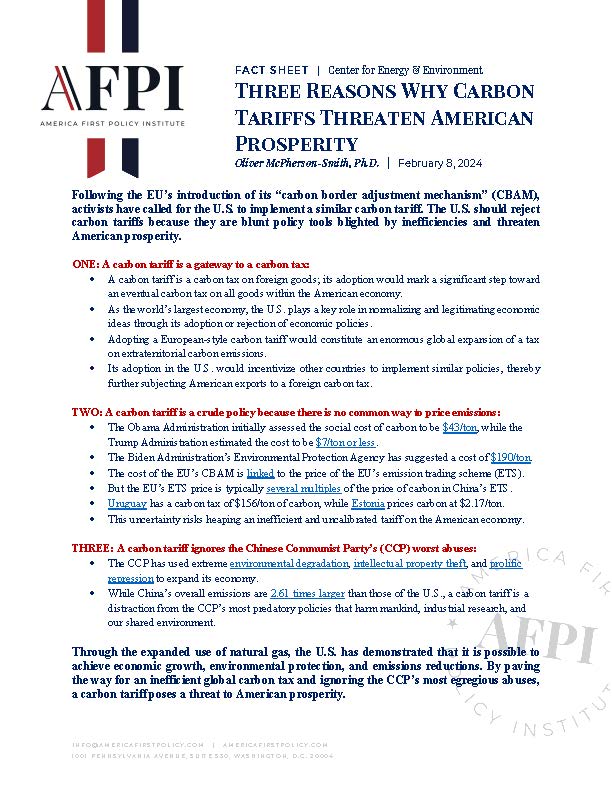Oliver McPherson-Smith,Ph.D
February 8, 2024
Three Reasons Why Carbon Tariffs Threaten American Prosperity
Following the EU’s introduction of its “carbon border adjustment mechanism” (CBAM), activists have called for the U.S. to implement a similar carbon tariff. The U.S. should reject carbon tariffs because they are blunt policy tools blighted by inefficiencies and threaten American prosperity.
ONE: A carbon tariff is a gateway to a carbon tax:
- A carbon tariff is a carbon tax on foreign goods; its adoption would mark a significant step toward an eventual carbon tax on all goods within the American economy.
- As the world’s largest economy, the U.S. plays a key role in normalizing and legitimating economic ideas through its adoption or rejection of economic policies.
- Adopting a European-style carbon tariff would constitute an enormous global expansion of a tax on extraterritorial carbon emissions.
- Its adoption in the U.S. would incentivize other countries to implement similar policies, thereby further subjecting American exports to a foreign carbon tax.
TWO: A carbon tariff is a crude policy because there is no common way to price emissions:
- The Obama Administration initially assessed the social cost of carbon to be $43/ton, while the Trump Administration estimated the cost to be $7/ton or less.
- The Biden Administration’s Environmental Protection Agency has suggested a cost of $190/ton.
- The cost of the EU’s CBAM is linked to the price of the EU’s emission trading scheme (ETS).
- But the EU’s ETS price is typically several multiples of the price of carbon in China’s ETS.
- Uruguay has a carbon tax of $156/ton of carbon, while Estonia prices carbon at $2.17/ton.
- This uncertainty risks heaping an inefficient and uncalibrated tariff on the American economy.
THREE: A carbon tariff ignores the Chinese Communist Party’s (CCP) worst abuses:
- The CCP has used extreme environmental degradation, intellectual property theft, and prolific repression to expand its economy.
- While China’s overall emissions are 2.61 times larger than those of the U.S., a carbon tariff is a distraction from the CCP’s most predatory policies that harm mankind, industrial research, and our shared environment.
Through the expanded use of natural gas, the U.S. has demonstrated that it is possible to achieve economic growth, environmental protection, and emissions reductions. By paving the way for an inefficient global carbon tax and ignoring the CCP’s most egregious abuses, a carbon tariff poses a threat to American prosperity.
